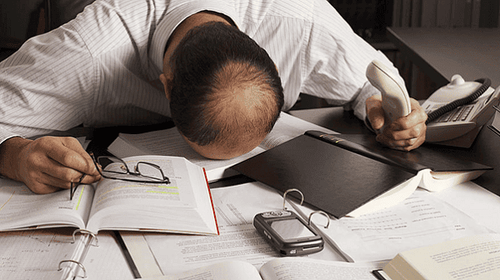This is an automatically translated article.
With the maximum development speed of industry 4.0 and the current rapid work cycle, mental exhaustion or mental instability is appearing more in many groups of people with age and status. difference. However, do you really understand all about this silent health hazard?
1. What is Mental Exhaustion?
Stress is something everyone experiences from time to time. This is considered our body's natural response to new, exciting or scary positive and negative situations. This biological response leads to an increase in stress hormones, including adrenaline and cortisol. This hormone boost helps us respond quickly to perceived threats and high-pressure situations that require quick thinking. Once the stressor has been eliminated, your body will return to normal.
However, mental exhaustion is often the result of long-term stress. It can leave you feeling overwhelmed and emotionally drained, and make your responsibilities and problems seem insurmountable. Mental instability, feelings of alienation and indifference to life can wreak havoc on every aspect of both your personal and professional life. You may feel stuck in your daily routine and don't have the energy to overcome any challenges or problems.
2. How to recognize mental exhaustion?
Mental exhaustion often causes physical as well as emotional symptoms. Besides, this state can also affect your behavior, which others can notice even before you do something.
Depending on the cause and extent of the negative effects, symptoms of mental instability can vary from person to person and usually begin to manifest gradually during periods of extreme stress. If stress continues to weigh on you, you'll feel like you're in a dark hole and can't see your way out. Many people call this "burnout," even though it's not a Officially recognized medical terminology.
Emotional signs of mental burnout may include:
Depression Anxiety Skepticism or pessimism Indifference (feeling unimportant) Choice of space alone Resentment feelings despair Feelings of fear Lack of motivation Decreased productivity Difficulty concentrating Physical signs of mental exhaustion may include:
Headache , stomach pain Body aches, persistent fatigue Changes in sensation appetite loss Insomnia Weight disturbances, unusual weight gain or loss Increased illness, such as colds and flu due to a weakened immune system Mental exhaustion can cause you to behave in ways not suitable for themselves. Behavioral signs may include:
Poor performance at work Withdrawal or social isolation Inability to hold and take responsibility in personal or work life Regular leave or absences from school More often In addition, you may experience mental and physical exhaustion. Physical exhaustion, which is a state of extreme fatigue that constantly leaves you physically exhausted, is a possible side effect of mental exhaustion. A 2017 review of 11 studies noted that mental burnout impairs physical performance and can make simple tasks or exercise feel physically demanding and taxing. significantly more.

Sự kiệt sức về tinh thần thường là kết quả của sự căng thẳng trong thời gian dài
3. Causes of Mental Exhaustion
The terms burnout and mental burnout are often used to refer to overwork or stress-related work in the workplace. Additionally, mental exhaustion can be caused by a long period of persistent stress in any area of your life.
Although mental burnout triggers are not the same for everyone, some common causes include:
High-pressure work, such as first responders and teachers working long hours Financial stress and poverty Dissatisfaction with work Being a carer for a sick or elderly loved one Living with a chronic illness The death of a loved one Giving birth and raising children Balance poor work-life balance Lack of social support
4. A guide to recovering from mental exhaustion
There are lifestyle changes you can use at home to help deal with stress and ease symptoms of mental burnout.
4.1. Eliminate stressors
You can't always get rid of the source of your stress, but it's the best way to treat the condition.
If you are overwhelmed by responsibilities at home or work, consider asking for help or delegating some of your work to someone else.
Enlisting the help of professional services is another way to ease your burden, such as a care home or a home helper if you have a loved one in need. Other responsibilities you can outsource are babysitting, cleaning, and errands.

Thời gian để nghỉ ngơi là một phần quan trọng trong việc điều trị chứng kiệt sức về tinh thần
4.2. Take time to relax
Time to rest and recharge is an important part of treating mental burnout. Be it an extended vacation, stopping your work schedule for a few days, or even just taking some time for yourself each day.
Going for a walk on your lunch break or watching a movie with friends once a week can do wonders for your stress levels.
4.3. Physical movement
It's not easy to find the motivation to exercise even on a beautiful day, but exercise has many proven benefits for your physical and mental health. You don't have to engage in a complicated or intense activity to reap instant benefits. Instead, moderate exercise, such as brisk walking, should also be considered.
Other proven benefits of exercise include:
reduce stress levels, reduce anxiety, improve mood, boost immune system.
4.4. Sleep more
Sleep is essential for your mental health. According to recommendations from scientists, you should try to get 8 hours of sleep every night.
One of the best ways to ensure you get a good night's sleep is to avoid spending too much time in bed throughout the day. Build a bedtime routine and stick to it, such as reading a light book for a few minutes at the same time each night.
4.5. Write diary
Negative thoughts and emotions can take a toll on your mental health, and are part of the cause of burnout. Journaling to write down the things you're grateful for each day can help you focus on the good things in life.
4.6. Medical treatment
Seeking professional help with mental burnout is also important. A mental health professional, such as a psychologist, can give you the tools you need, best suited for you to deal with stress and get through this difficult time.
Alternatively, you can talk to your doctor about your symptoms. The doctor may then consider medications to help control symptoms and overcome mental exhaustion with other techniques and therapies. Medications that may be used to treat mental exhaustion include antidepressants, anti-anxiety medications, and sleep aids.
Please dial HOTLINE for more information or register for an appointment HERE. Download MyVinmec app to make appointments faster and to manage your bookings easily.
References: healthline, verywellmind













